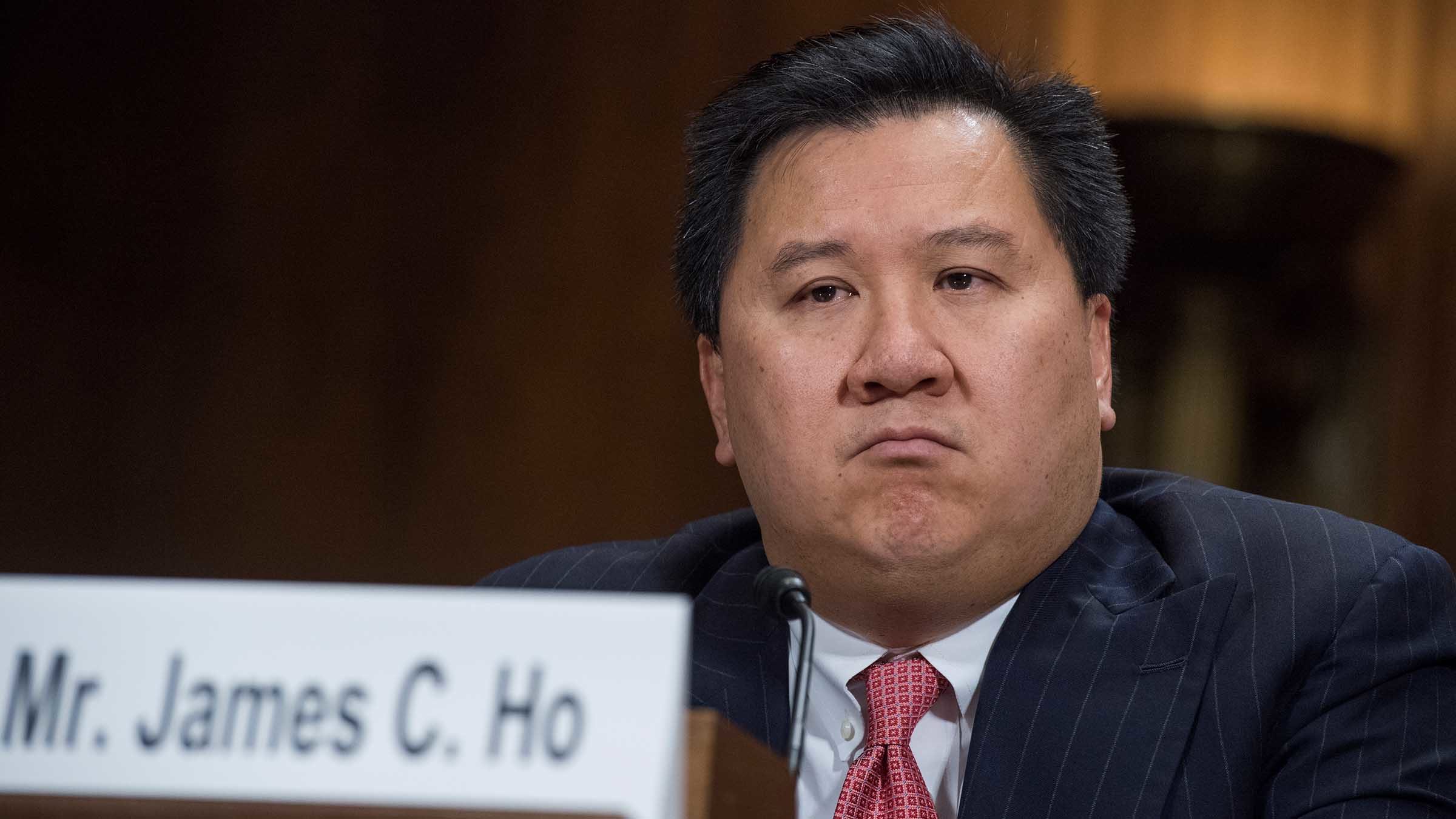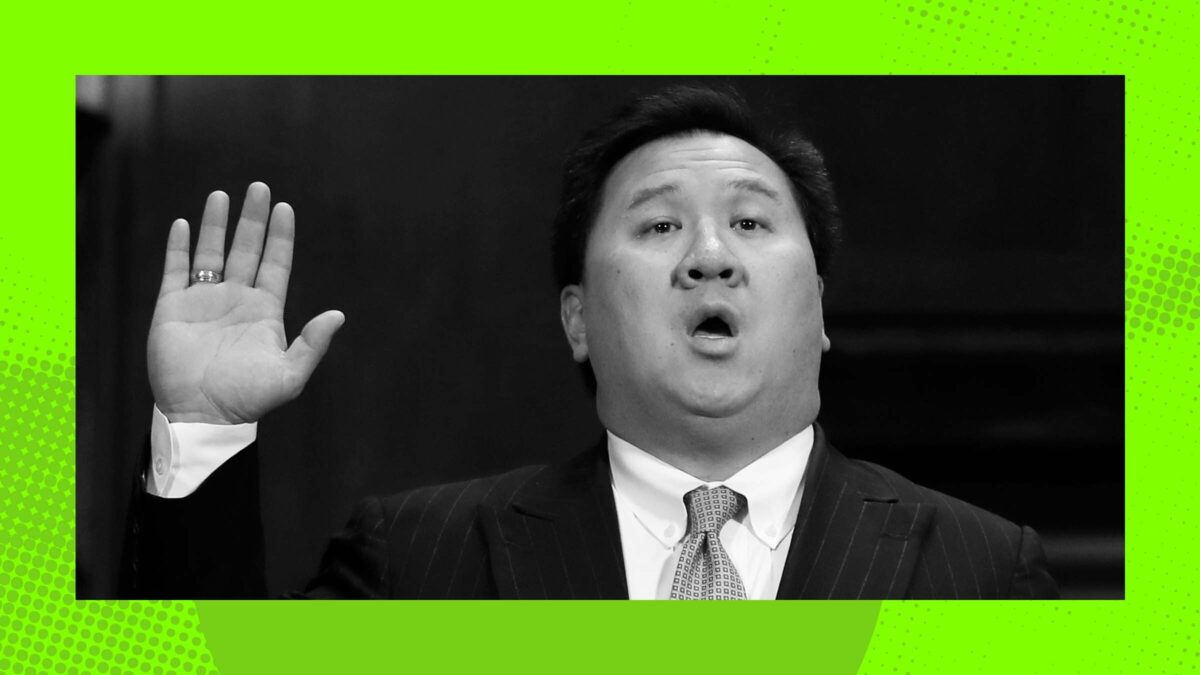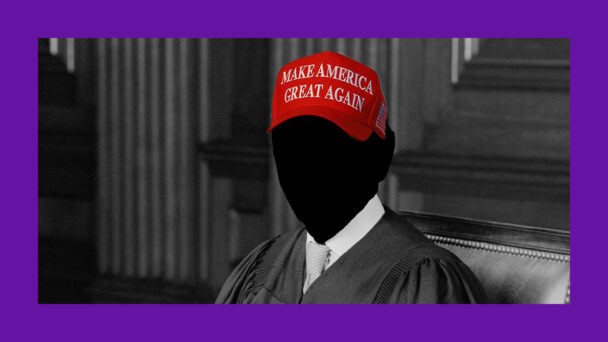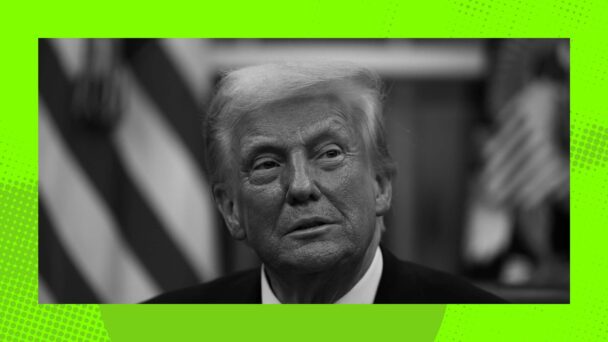Getting on this White House’s Supreme Court shortlist is a matter of showing that you will be loyal to the president above all else.
Of the many Trump judges who are angling for a promotion to the Supreme Court, no one is campaigning harder than Fifth Circuit judge James Ho, whose primary metric for success is the number of times the Wall Street Journal editorial board cites him with approval each week. But in an opinion published Tuesday, Ho debuted an even more ambitious strategy for earning the president’s attention: arguing that the current Court is showing its “disrespect” for Trump, and making clear that if he were a justice, James Ho would be an obedient little boy who would never dare speak out of turn.
On Friday, the Supreme Court issued an order that temporarily blocked the Trump administration from removing certain Venezuelan immigrants from the United States, reversing an earlier Fifth Circuit decision; only Justices Samuel Alito and Clarence Thomas dissented. After the Court sent the case, A.A.R.P. v. Trump, back to the Fifth Circuit for further proceedings, a three-judge panel that included Ho issued an order putting the case back on the Fifth Circuit’s schedule for oral argument. There is nothing substantive about the order, a three-sentence formality that is more or less an Outlook calendar invite. Here, see for yourself:

Ho, however, was unsatisfied with this result. Instead, he wrote a concurring opinion only for himself in which he acknowledged that although he is “duty-bound” to follow Supreme Court orders, he doesn’t “have to like it.” From there, Ho proceeded to rehash Alito’s “vigorous” dissent in A.A.R.P., quoting it eight times in seven pages to underscore his “sincere concerns” about how very unfairly the Court has treated Mister Trump in this case. What Ho understands is that to make the Supreme Court shortlist these days, it is no longer enough to simply be a conservative judge. You have to be a conservative judge with a demonstrated willingness to polish the president’s boots with your tongue upon request.
The issue in A.A.R.P. is about how long a person who has asked a district court for emergency relief—here, protection from removal from the United States—needs to wait for an answer from that district court before going ahead and filing an appeal. The Fifth Circuit had ruled that the challengers in this case had imposed an “unreasonable deadline” on the district court, and thus dismissed their appeal as premature. But the Supreme Court disagreed, pointing to evidence that the plaintiffs were in imminent danger of being removed; since the district court hadn’t acted, the Court reasoned, the plaintiffs were entitled to escalate the matter before armed state agents herded them onto planes and shipped them to a gulag overseas.
Ho found the Court’s conclusion outrageous, and used his opinion to take swipes at two of the conservatives who had the gall to join the majority. Describing the Fifth Circuit’s (overruled) decision as “unanimous because it’s obvious,” Ho called out Justice Amy Coney Barrett for previously criticizing litigants for trying to “force” judges to work “on a short fuse,” implicitly charging Barrett with abandoning her principles this time around.
Even more audaciously, Ho began his analysis by asserting that “it is not the role of the judiciary to check the excesses of the other branches.” This is both wrong, as anyone who learned about “checks and balances” in social studies can attest, and also a rather ostentatious proclamation to lead with in a case that is, again, supposed to be about the propriety of interlocutory appeals of constructively denied lower court orders. But it is also a near-verbatim quote from Chief Justice John Roberts, who made headlines earlier this month for saying that the judiciary must sometimes “check the excesses” of the executive branch.
What we have here, in other words, is an inferior court judge openly mocking the Chief Justice of the United States for having made a milquetoast allusion to a basic feature of the Constitution’s structure. It is hard to overstate how beyond the pale this is supposed to be within the federal judiciary. As far as stunts go, it is roughly analogous to a high school teacher kicking off every assembly by doing a bit in which they loudly and theatrically pretend to die of boredom as soon as the principal walks into the gym.

(Photo By Tom Williams/CQ Roll Call)
Where things really got weird is in the final section, when Ho transitioned from relitigating his loss in A.A.R.P. to offering a spirited defense of Trump’s honor that even Lou Dobbs would find a little embarrassing. “Our adversarial legal system has long been premised on the notion that judges should impartially consider the views of both sides of any dispute,” Ho wrote. “It should go without saying that the President and his fellow Executive Branch officials deserve the same respect that courts regularly afford every other litigant—including other Presidents and officials.” He then ticked off a laundry list of historical conflicts between the Court and the executive branch: President Barack Obama’s public disagreement with a Supreme Court ruling in 2010, the Court’s 2001 disbarment of former President Bill Clinton, and President Joe Biden’s comment, in 2024, that he hadn’t let the Court’s decision to strike down his student debt relief plan “stop” him from extending more modest forms of relief.
“I doubt that any court would deny any of these Presidents the right to express their views in any pending case to which they are a party,” Ho wrote. “Our current President deserves the same respect.”
Ho’s argument here is a little hard to clock at first, since it is not immediately clear what Bill Clinton getting disbarred a quarter-century ago has to do with Trump’s efforts to disappear more brown people by the hour. But what Ho is saying is that by ruling against Trump in A.A.R.P., but ostensibly treating previous (Democratic) presidents fairly in unrelated, cherry-picked contexts, the Supreme Court has betrayed its bias against him. I was to stress that there is no legal analysis here: All Ho is doing is aping the rhetoric of randomly capitalized Truth Social posts complaining about the Court, and hoping that when the time comes, it will be enough to persuade Trump that Aileen Cannon needs more time to gain some experience on the bench.
If Ho were trying to get a job in any other workplace, his comments would probably take him out of the running, since a record of publicly castigating two of your would-be colleagues as hypocritical ingrates makes for an uncomfortable interview process. But Ho’s intended audience is not the justices, because they are not the ones who do the hiring around here. If you are an aspiring Supreme Court justice, getting Trump to notice you is not a matter of attending the right schools, clerking for the right judges, or giving speeches to the right anti-choice activist groups. It is about making clear that if you are lucky enough to get nominated to a life-tenured Supreme Court seat, you will never forget who put you there, and will return the favor when asked.
By writing an opinion in which he effectively shadow-joins Alito and Thomas in dissent, Ho is signaling to the White House that he would not be just any conservative Supreme Court justice—one who, like Barrett or Roberts, might occasionally disappoint conservatives with their votes. Instead, Ho is promising to be a conservative justice in the mold of the Court’s two most enthusiastic Trump supporters who love nothing more than giving him everything he wants.
There used to be lots of qualifications for being a Supreme Court justice. But this is the only one Trump cares about.





